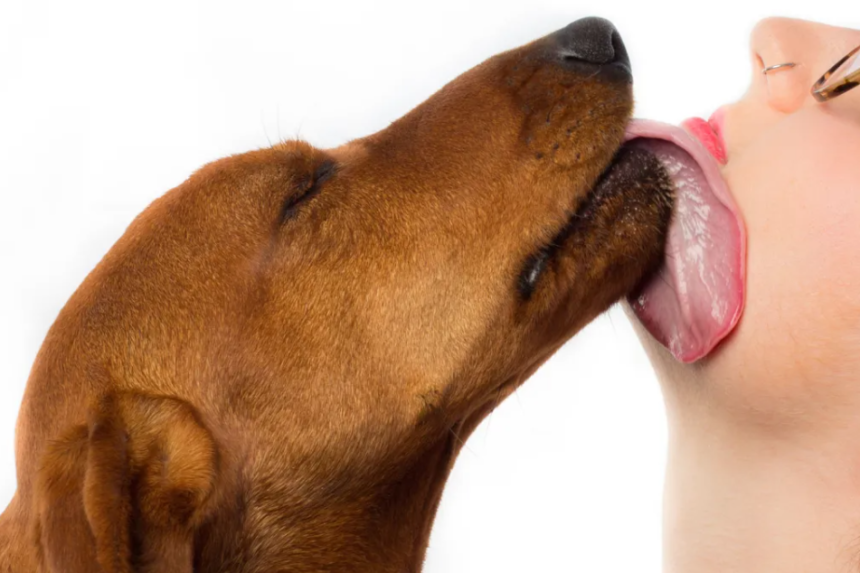Dachshunds are commonly known as wiener dogs or sausage dogs due to their long bodies, short legs, and lively personalities. These charming canine companions are also famous for their habit of licking, often showering their owners, fellow pets, and even inanimate objects with their wet tongues. While you may find yourself asking, ‘Why Do Dachshunds Lick So Much?‘ at first, there are several reasons why they engage in this affectionate gesture. Check out this article to discover why Dachshunds lick so frequently.

Why do dachshunds lick so much?
Affection and Bonding
Dachshunds often lick their owners as a way to display affection and build a stronger connection. The act of licking releases endorphins in the dog’s brain, which brings about feelings of happiness and calmness. This behavior is comparable to humans hugging or kissing to demonstrate love and concern.
Exploration and Curiosity
Dogs, such as dachshunds, use their tongues to investigate their surroundings. Licking helps them taste and smell, enabling them to gather details about their environment. This tendency is particularly noticeable in inquisitive and lively dachshunds who are constantly excited to explore new objects.
Attention-Seeking Behavior
Dachshunds may lick you as a way to grab your attention. If they see that licking results in you petting them, talking to them, or giving them treats, they might continue licking to interact with you. This behavior is their way of expressing their need for companionship and love.
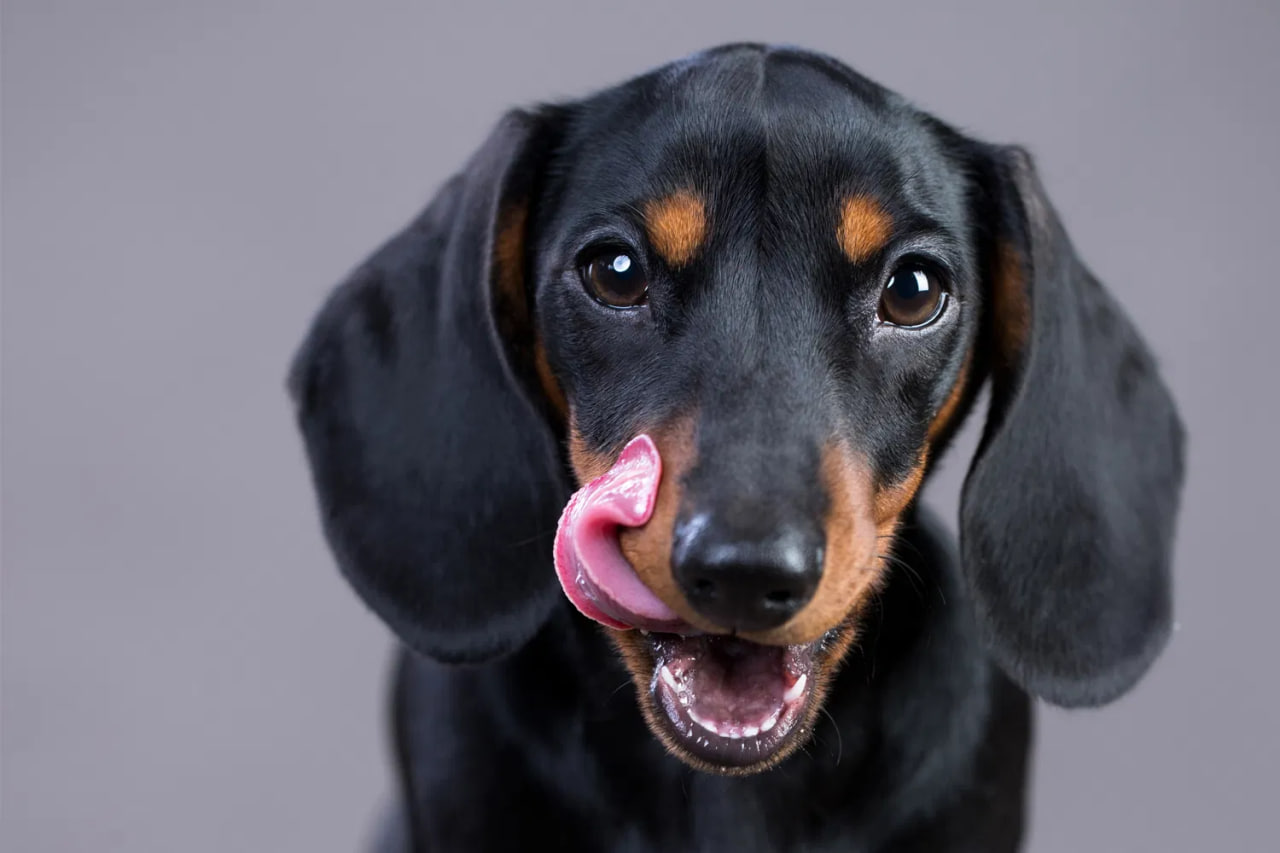
Anxiety and Stress Relief
Licking can serve as a way to deal with anxiety and stress. Similar to how people may bite their nails or fidget when feeling nervous, dachshunds might lick themselves or their surroundings to comfort themselves. It is important to determine and tackle the underlying cause of your dog’s anxiety for their overall health and happiness.
Grooming Instinct
Dogs have an innate grooming behavior. Licking is a natural part of this instinct, aiding them in maintaining the cleanliness of their fur.

Exploration and Information Gathering
Dogs investigate their environment by using their mouths. Licking is a way for dachshunds to learn about the world around them, and it is a normal aspect of their curious behavior.
Medical Causes of Excessive Licking
Allergy and Skin Irritation
Dogs may lick excessively due to allergies or skin irritations in an effort to relieve their itchiness or discomfort.
Gastrointestinal Problems
Digestive problems, like feeling sick or discomfort in the stomach, can cause a rise in licking behavior.
Pain or Discomfort
If your dachshund is feeling pain or discomfort, they might lick excessively in an attempt to alleviate it.
Neurological Problems
Some neurological disorders may result in uncontrollable licking behavior.
Hormonal Imbalance
Hormonal fluctuations can lead to alterations in behavior, such as increased licking.
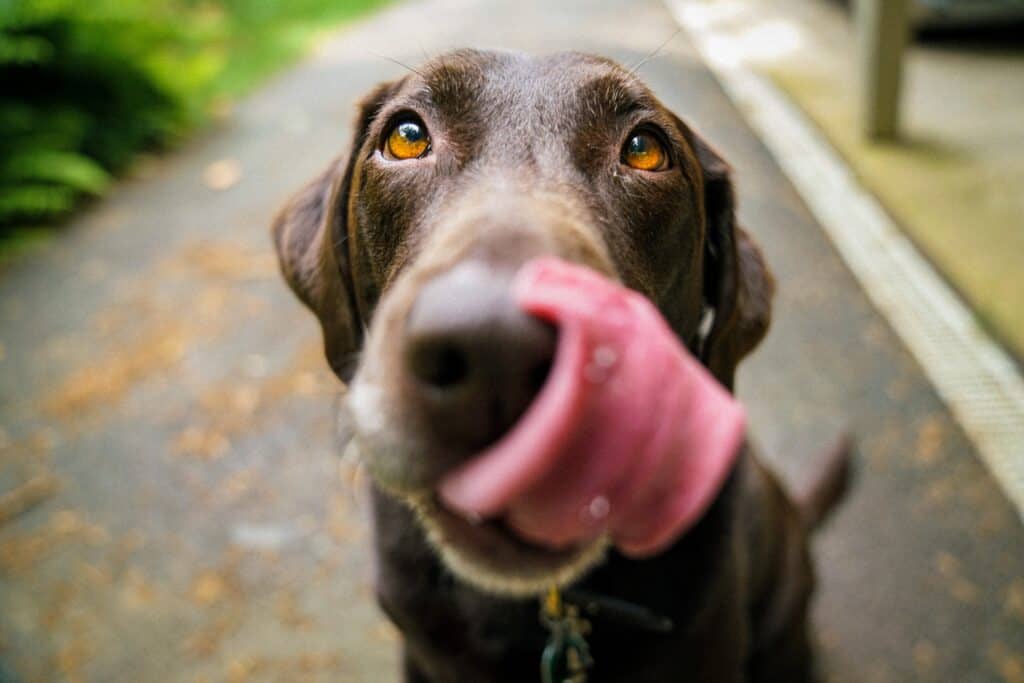
Behavioral Factors Influencing Licking
Breed Characteristics
Dachshunds have distinct traits and behaviors that are specific to their breed, and these can impact how often they lick.
Past Experiences and Conditions
The licking behavior of your dachshund can be influenced by their previous experiences, such as where they lived before or any past trauma they may have experienced.
Coercive Behavior
If your dachshund has been given treats or attention in the past for licking, they may keep licking in hopes of getting the same rewards.
Lack of Mental Stimulation
Not having enough mental stimulation can result in feeling bored, which may lead to licking as a way to comfort oneself.

When to Be Concerned About Excessive Licking
Signs of Problematic Licking
Be alert to signs such as excessive licking of certain spots, loss of hair, or the presence of sores, as these may suggest hidden problems.
Potential Complications of Excessive Licking
Excessive licking may result in issues like skin infections, wounds, and other health complications.
When to Consult a Veterinarian
If your dachshund is licking excessively or in a strange manner, it is important to seek advice from a vet to check for any potential medical problems.
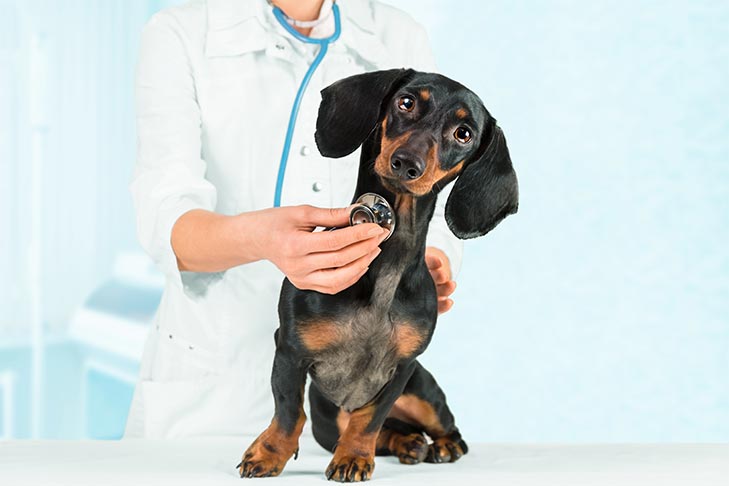
Ressing Overzealous Licking in Your Dachshund: Achieving Equilibrium
Although occasional licking is a common and endearing behavior, excessive licking from your dachshund can become bothersome or indicate underlying health issues. If your dachshund’s licking becomes excessive, consider the following recommendations:
Exclude Health Issues
Consulting your veterinarian is crucial to rule out any underlying health issues, such as allergies, skin irritations, or digestive problems, that may be causing your dachshund to excessively lick.
Offer Sufficient Physical and Mental Engagement
Ensure that your dachshund is receiving enough exercise and mental stimulation to prevent boredom and agitation, which may lead to increased licking. Wondering, ‘How much exercise does a Dachshund need?‘ Providing regular walks, playtime, and interactive activities can be helpful.
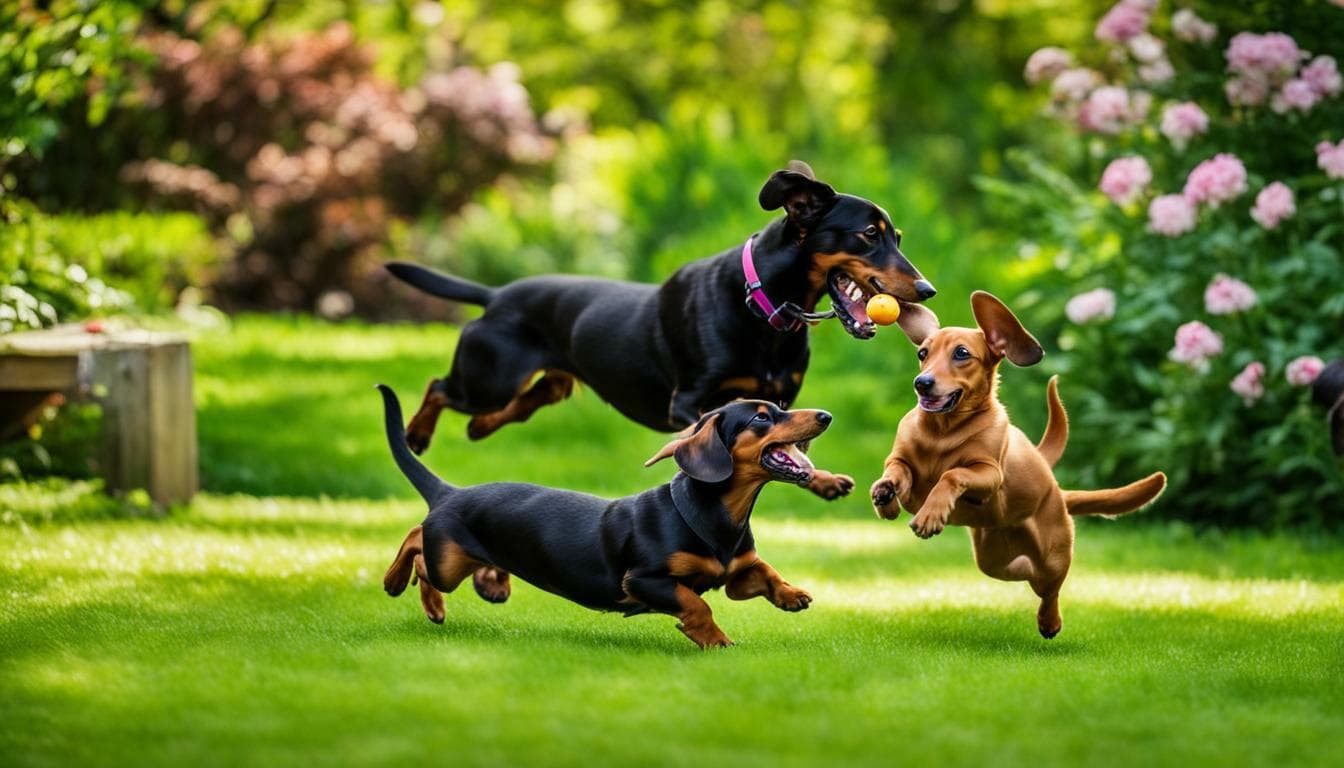
Encourage with Positive Reinforcement
Reward your dachshund with treats, praise, and love when they show calm behavior without licking. This positive feedback encourages good behavior and reduces the urge to lick for attention.
Divert Their Focus
If you see your dachshund licking too much, redirect their attention to different activities such as chew toys, puzzle feeders, or training exercises. This redirection can help them use their energy in a more positive manner and decrease excessive licking.
Consult a Professional
If your dog keeps licking excessively even after you’ve tried to stop it, it might be a good idea to consult with a professional dog trainer or behaviorist. They can provide tailored advice and training techniques to address the root cause of the behavior.
It’s important to remember that persistent licking could indicate underlying issues, so it’s always wise to consult with your vet to rule out any health-related concerns and seek expert help if needed. By being patient, understanding, and implementing appropriate strategies, you can nurture a strong bond with your affectionate dachshund, ensuring their well-being and your own happiness.

Training Tips to Redirect Licking Behavior
Is it simple to train dachshunds? Teaching a dachshund may have its difficulties, but with the correct methods and ongoing dedication, it can be a satisfying process for both the dog and its owner. By using successful training techniques and comprehending their actions, you can effectively change behaviors such as too much licking.
Positive Reinforcement
Utilizing positive reinforcement is highly effective in changing your dachshund’s behavior. When your dog refrains from licking or displays desired behaviors, reward them with treats, praise, or affection. For instance, if your dachshund stops licking upon command, promptly give them a reward to encourage this behavior.
Teach the Leave It Command
Teaching your dachshund the leave it command can be a useful way to manage their licking behavior. Begin by holding a treat in your hand and letting your dog sniff it. Once they refrain from trying to grab the treat, say leave it and give them a different treat from your other hand as a reward. As your dachshund learns, you can progress by placing the treat on the floor and only giving a reward when they successfully obey the leave it command.
Offer Appropriate Chew Toys
Giving your dachshund the right chew toys can help steer their licking habits in a different direction. Chew toys can fulfill their need to chew and lick, giving them a healthy way to express their natural behaviors. Make sure the toys are strong and secure, and switch them out frequently to keep your dog engaged.
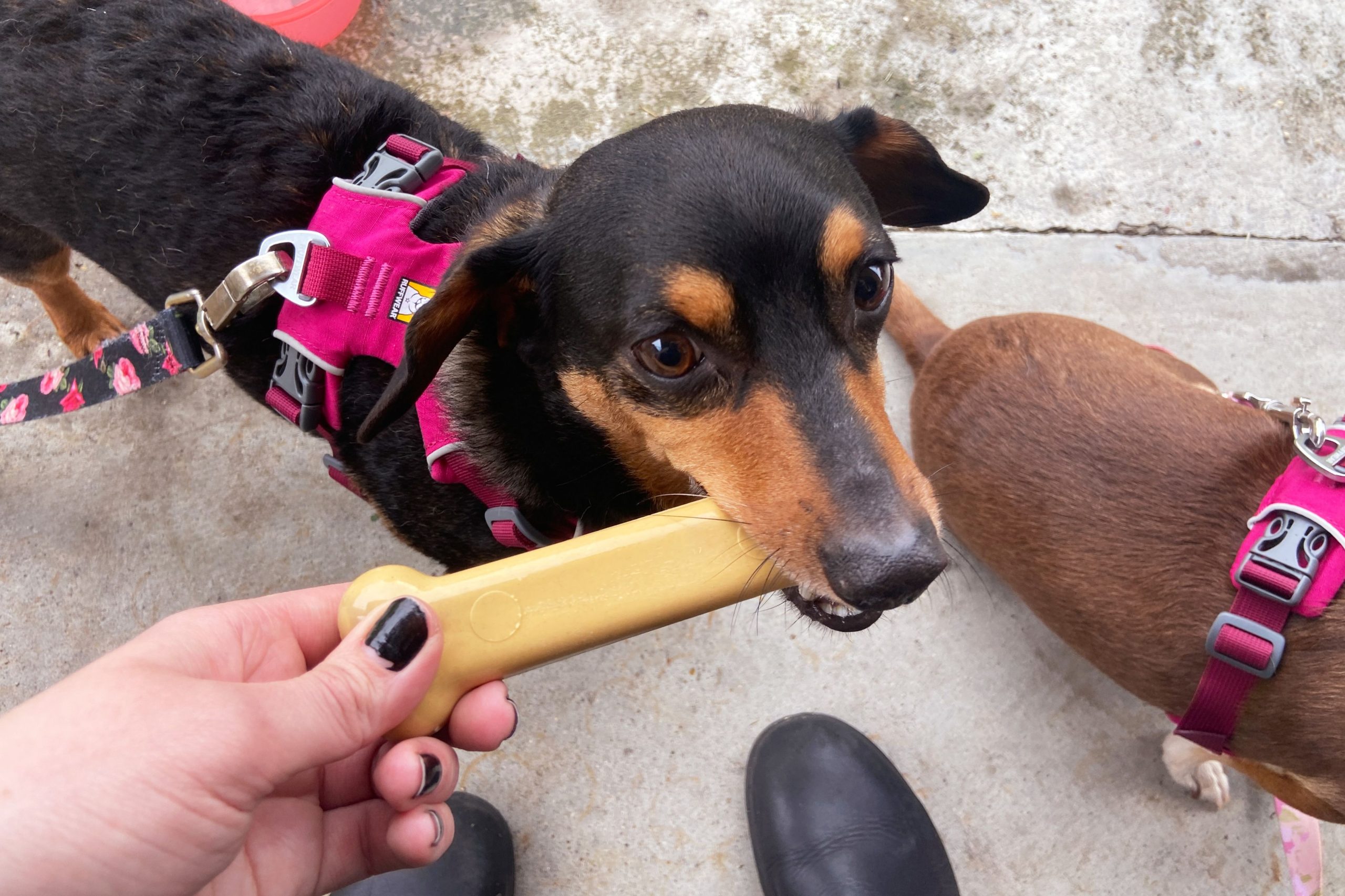
Prevent Boredom with Mental Stimulation
Providing mental activities is important in addressing excessive licking due to boredom. Introduce puzzle toys, interactive play, and training sessions to engage your dachshund’s mind. Teaching them new skills or commands can offer mental stimulation and help decrease unwanted licking habits.
Establish a Consistent Routine
Dogs do well with a regular schedule, and sticking to a consistent daily routine can reduce stress and anxiety, which could be causing excessive licking. Create a schedule that includes set times for meals, walks, playtime, and rest. Maintaining a predictable routine will make your dachshund feel safe and decrease behaviors triggered by unpredictability.
Address Anxiety and Stress
Identify and deal with the reasons behind your dachshund’s excessive licking, which could be related to anxiety and stress. Consider creating a peaceful setting, using calming products like pheromone diffusers, or setting up a secure area where your dog can relax. If anxiety continues, seek advice from a vet or a qualified dog behavior expert for further assistance.

Use Distraction Techniques
Using distraction methods can successfully shift your dachshund’s focus away from licking. If you observe your dog licking excessively, involve them in a game, training activity, or take them for a walk. Diverting their attention can interrupt the licking behavior and promote different actions.
Avoid Punishment
Punishing your dachshund for licking is usually not effective and can actually make them more anxious, leading to increased licking. Instead of scolding them, it’s better to focus on positive reinforcement and redirection methods. Rewarding good behavior and providing suitable ways for your dog to express their instincts will have more long-term benefits.
By following these training tips and techniques, you can help your dachshund reduce excessive licking and encourage healthier behaviors. Consistency, patience, and a positive approach are essential for effectively managing and redirecting your dog’s licking tendencies.
Read more at Best dog food for Dachshunds
Conclusion
Knowing the reason behind dachshunds’ excessive licking can strengthen the relationship between owner and pet, creating a strong bond based on mutual understanding and companionship. Understanding ‘Why Do Dachshunds Lick So Much‘ can help in this regard.
In essence, the frequent licking habit of dachshunds highlights their natural longing for connection and intimacy with their loved ones. Accepting and reciprocating this behavior with patience and love not only strengthens the bond between pet and owner but also brings joy to both individuals.

